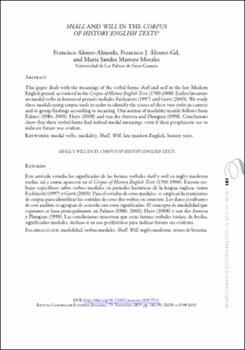Shall and Will in the Corpus of History English Texts
Fecha
2019Resumen
Este artículo estudia los significados de las formas verbales shall y will en inglés moderno
tardío, tal y como aparecen en el Corpus of History English Texts (1700-1900). Existen trabajos
específicos sobre verbos modales en períodos históricos de la lengua inglesa, como
Fachinetti (1997) y Gotti (2003). Para el estudio de estos modales, se emplean herramientas
de corpus para identificar los sentidos de estos dos verbos en contexto. Los datos resultantes
de este análisis se agrupan de acuerdo con estos significados. El concepto de modalidad que
seguimos se basa principalmente en Palmer (1986; 2001), Hoye (2008) y van der Auwera
y Plungian (1998). Las conclusiones muestran que estas formas verbales tenían, de hecho,
significados modales, incluso si su uso perifrástico para indicar futuro era evidente. This paper deals with the meanings of the verbal forms shall and will in the late Modern
English period, as evinced in the Corpus of History English Texts (1700-1900). Earlier literature
on modal verbs in historical periods includes Fachinetti (1997) and Gotti (2003). We study
these modals using corpus tools in order to identify the senses of these two verbs in context
and to group findings according to meaning. Our notion of modality mainly follows from
Palmer (1986; 2001), Hoye (2008) and van der Auwera and Plungian (1998). Conclusions
show that these verbal forms had indeed modal meanings, even if their periphrastic use to
indicate future was evident.





